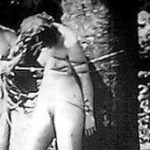The phrase that kept running through my mind when I watched The Notorious Bettie Page was a line from William Blake’s “Proverbs of Hell”, part of “The Marriage of Heaven and Hell”: The nakedness of woman is the work of God.
The film covers Page’s career as a pinup and bondage model, under the cameras of John Willie, Bunny Yeager and Irving Klaw (though the film suggests his sister Paula Klaw did the actual photography). Page, as played by Gretchen Mol, was a woman destined to be a pinup model: a natural beauty and exhibitionist who comes alive in front of a camera, except when she’s called on the act.
Page is also a devout woman who retained her own kind of knowing innocence even when she’s bound and gagged. Her good nature comes through so well that that when a shutterbug sees her pose nude (not naked), we feel the same combination of gratitude, desire and protectiveness.
Harron’s film takes a very delicate approach to Page’s life. Childhood incest and a gang rape are covered discretely. I can’t tell if this is on the theory that such events really didn’t have a great impact on her, or just discretion and caution. Perhaps the point of this film is that the worst things that happened to Page weren’t at the hands of the porn industry. The people she meets in the wonderland of camera clubs and photo distributors are harmless eccentrics. It’s the police, Hollywood and Washington who look like hypocrites and exploiters.
The film looks at the subculture of camera clubs and porn producers in the 1940s and 1950s. The Klaws treat fetish pictures and videos as their market niche, while their buddy John Willie, played as a dissipated Englishman, treats it as art. Their wares go out to a select market of collectors via men’s magazines and porn shops, where the magazines and booklets are kept under the counter. Klaw, being grilled by Estes Kefauver in his crusade against juvenile deliquency, points out that movies like Tarzan and the Slave Girl show women tied up with whip marks. Other advertisements and movies and so on from the era showed bondage and spanking, and I agree with the movie’s suggestion that Kefauver went after Klaw’s operation because he was the low-hanging fruit. Hollywood and Broadway and Madison Avenue have the money to fight this kind of attack, while shoestring operations like Klaw don’t.
“The Notorious Bettie Page” is perhaps a little too delicate and discreet about its subject matter. However, there’s always the temptation to cast her life, from abused young woman to porn queen to born-again preacher, as a conventional, St. Augstine-style morality play. That would be too simplistic and judgmental. Page left the porn culture, but didn’t deny or disown the years she spent in it. It was just one phase of her life, and a part of what made her who she is.



